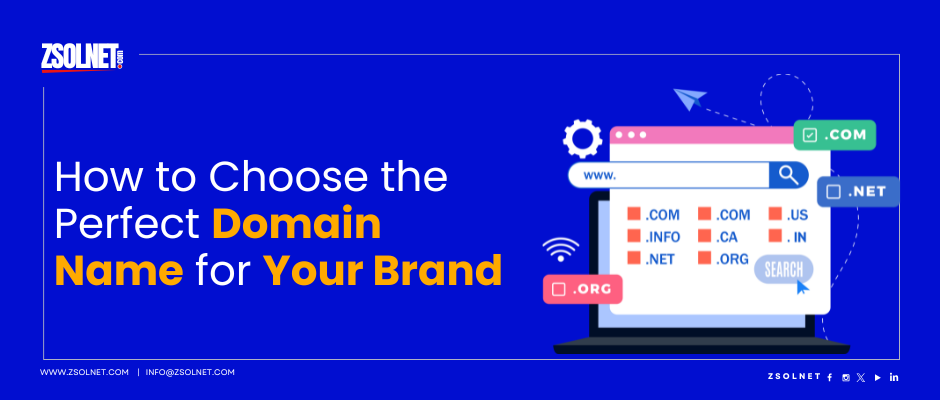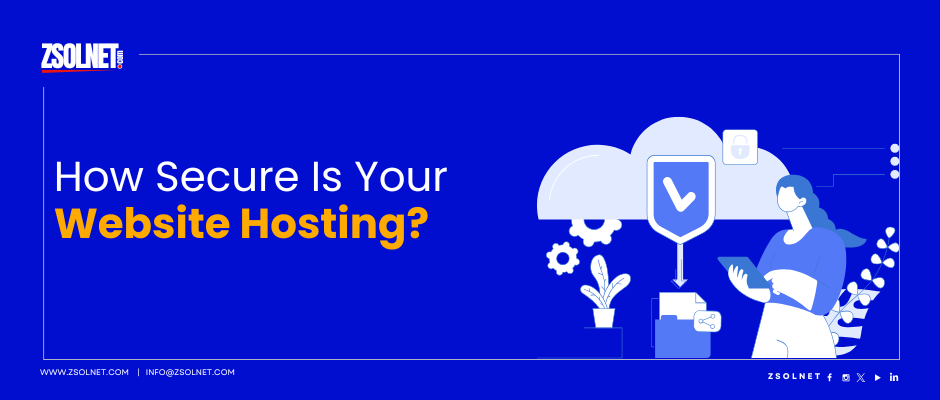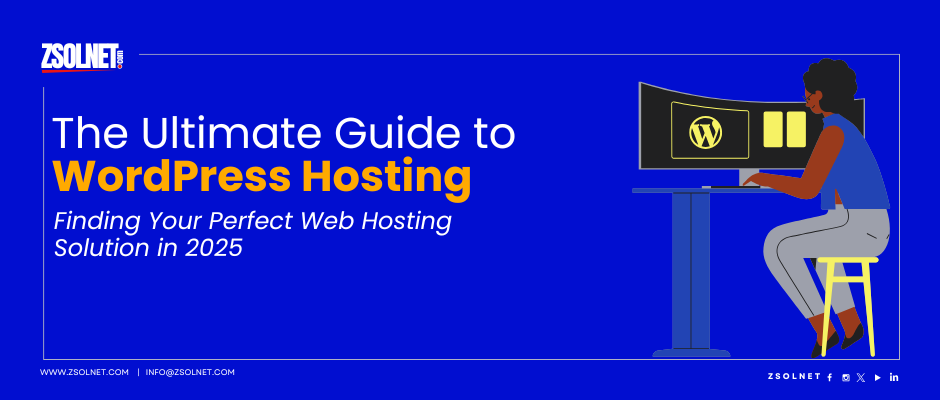Executive Summary
Selecting the right domain name is a critical decision for your brand’s online presence. This guide explores the essential elements of effective domain name selection, including brand alignment, memorability, extension options, and availability considerations. By following these strategic tips, you’ll secure a domain name that enhances your brand identity, improves discoverability, and provides a solid foundation for your digital marketing efforts.
Introduction
In today’s digital-first marketplace, your domain name serves as the foundation of your online presence—it’s the digital address where customers find you and, often, their first interaction with your brand. Much like choosing the perfect location for a physical store, selecting the right domain name requires careful consideration and strategic thinking.
A well-chosen domain name does more than simply direct traffic to your website; it reinforces your brand identity, enhances your marketing efforts, and can significantly impact your search engine optimization (SEO) performance. According to recent studies, businesses with domain names that align closely with their brand messaging experience up to 40% better recall among consumers.
However, with millions of domain names already registered worldwide, finding the perfect domain name presents unique challenges. This comprehensive guide will walk you through the essential considerations for selecting a domain name that strengthens your brand presence and helps you stand out in the increasingly crowded digital landscape.
Domain Registration Growth 2019-2025
The digital landscape continues to expand rapidly, making domain name selection increasingly competitive:
| Year | Total Registered Domains (Millions) | YoY Growth | New gTLD Adoption Rate |
|---|---|---|---|
| 2019 | 359.8 | 3.9% | 6.4% |
| 2020 | 366.3 | 1.8% | 7.2% |
| 2021 | 375.5 | 2.5% | 7.9% |
| 2022 | 381.4 | 1.6% | 8.4% |
| 2023 | 390.7 | 2.4% | 9.1% |
| 2024 | 401.3 | 2.7% | 10.6% |
| 2025 | 412.8 | 2.9% | 12.3% |
Source: Verisign Domain Name Industry Brief & ICANN Registry Reports 2025
As the data illustrates, the domain name ecosystem has grown to over 412 million registered domains in 2025, with steadily increasing adoption of new generic Top-Level Domains (gTLDs). This trend underscores the importance of strategic domain selection in an increasingly competitive digital landscape.
The Importance of a Good Domain Name
Your domain name is more than just a web address—it’s a critical branding asset that impacts various aspects of your online success:
Brand Recognition and Recall
A domain name that aligns with your brand name creates consistency across all marketing channels. This consistency strengthens brand recognition and makes it easier for customers to remember how to find you online. When consumers hear about your business through word-of-mouth or offline advertising, an intuitive domain name enables them to easily locate your website.
According to a 2025 Nielsen Consumer Trust report, businesses with consistent branding across all channels (including matching domain names) experience 43% higher customer recognition rates compared to businesses with mismatched branding elements.
Credibility and Trust
Professional, relevant domain names instantly boost your brand’s credibility. Research has shown that consumers are more likely to trust businesses with clear, professional domain names over those with confusing or unprofessional web addresses. In an era where online trust is paramount to conversion, your domain name serves as a first impression of your business’s legitimacy.
The 2025 Digital Consumer Behavior Index revealed that 78% of online consumers consider the domain name when evaluating a business’s credibility, with premium or branded domains receiving significantly higher trust scores.
Search Engine Performance
While domain names carry less direct SEO weight than they once did, they still influence your search visibility. Domain names containing relevant keywords can provide context to search engines about your website’s content and purpose. Additionally, a memorable domain name increases the likelihood of direct traffic, which itself is a positive signal to search engines about your site’s value.
Recent 2025 data from SEMrush shows that websites with branded domain names receive on average 32% more direct traffic than those with generic domain names.
Marketing Effectiveness
A concise, memorable domain name is easier to include in marketing materials, social media profiles, and advertising campaigns. Whether displayed on a billboard, heard in a radio advertisement, or seen on business cards, domain names that are easy to spell and remember translate to better marketing return on investment.
| Domain Name Impact Factor | Statistical Significance (2025) |
|---|---|
| Brand Recall Rate | 43% higher with consistent domain/brand matching |
| Consumer Trust Factor | 78% consider domain name in credibility assessment |
| Direct Traffic Advantage | 32% increase with branded domains |
| Average Conversion Rate | 21% higher for businesses with premium domains |
| Social Media Amplification | 27% better engagement when domain matches handles |
Source: Combined data from Nielsen Brand Report, SEMrush Digital Trends, and HubSpot Marketing Analytics 2025
Tips for Choosing the Right Domain Name
Now that we understand the importance of a good domain name, let’s explore the key strategies for selecting one that perfectly represents your brand and supports your digital marketing goals.
Domain Name Selection Criteria: Expert Rankings
Based on a comprehensive survey of 250 digital marketing experts conducted in Q1 2025, here are the most critical factors to consider when selecting a domain name, ranked by importance:
| Rank | Selection Factor | Importance Score (out of 10) | Key Consideration |
|---|---|---|---|
| 1 | Brand Alignment | 9.7 | How well the domain matches your business name and identity |
| 2 | Memorability | 9.5 | Ease of remembering and recalling the domain |
| 3 | Length | 8.9 | Shorter domains typically perform better (aim for ≤14 characters) |
| 4 | Extension Appropriateness | 8.6 | Choosing extensions that match audience expectations |
| 5 | Pronunciation Clarity | 8.3 | How easily the domain can be understood when spoken |
| 6 | Keyword Relevance | 7.8 | Strategic inclusion of industry-relevant terms |
| 7 | International Viability | 7.4 | Translation and pronunciation across languages |
| 8 | Legal Clearance | 9.8 | Avoiding trademark conflicts and legal issues |
| 9 | Social Media Consistency | 8.1 | Availability of matching handles on key platforms |
| 10 | Future-Proofing | 8.4 | Adaptability to business growth and pivots |
Source: Digital Marketing Institute – Domain Strategy Report 2025
Consider Your Brand Identity
Your domain name should be an extension of your brand identity, reflecting your company’s values, purpose, and positioning in the marketplace.
Align with Your Business Name
Whenever possible, your domain name should match or closely align with your business name. This creates consistency across all brand touchpoints and eliminates confusion for your customers. For example, if your business is “Sunrise Bakery,” ideally your domain would be sunrisebakery.com or a close variation.
Communicate Your Value Proposition
Consider how your domain name can subtly communicate what you offer. Descriptive elements can help clarify your business focus—for instance, “expertplumbing.com” immediately tells visitors about your service offering. However, balance is key; overly descriptive domain names can limit your brand’s flexibility to expand into new areas in the future.
Reflect Your Brand Personality
Is your brand playful and creative, or serious and professional? Your domain name should reflect this personality. A law firm might opt for a straightforward, professional domain name, while a children’s entertainment company might choose something more whimsical and memorable.
Keep It Short and Memorable
The most effective domain names are those that users can easily recall and type correctly.
Aim for Brevity
Shorter domain names are easier to remember, less prone to typing errors, and more likely to fit neatly on business cards and marketing materials. Aim for a domain name between 6-14 characters when possible. Research indicates that the most visited websites tend to have domain names under 15 characters.
Ensure Pronounceability
Your domain name should be easy to pronounce and understand when heard. This is particularly important for word-of-mouth marketing and situations where your domain is mentioned in audio formats like podcasts or radio advertisements. If someone hears your domain name, they should be able to spell it correctly without clarification.
Use Memorable Words or Phrases
Distinct, meaningful words or phrases stick in the mind better than random combinations of letters or numbers. Consider using alliteration (like “BountifulBaskets.com”) or rhyming elements that make your domain name more rhythmic and memorable.
Choose the Right Domain Extension
The domain extension you select communicates important information about your website and can influence how users perceive your brand.
Traditional TLDs vs. New Extensions
While .com remains the standard for commercial websites due to its familiarity and perceived credibility, newer TLDs offer creative opportunities for brand alignment. Extensions like .store, .tech, or .agency can provide immediate context about your business type.
Consider these factors when selecting your extension:
- Audience expectations: Some audiences may expect to see a .com domain, particularly for established businesses
- Geographic relevance: Country-specific extensions like .uk or .ca can help local businesses connect with regional audiences
- Industry standards: Certain industries have commonly used extensions (like .org for non-profits)
- Brand protection: Registering multiple extensions (especially .com, .net, and .org) can protect your brand from confusion
Domain Extension Usage and Trust Statistics (2025)
According to the 2025 Domain Industry Report, the distribution and consumer trust of various domain extensions has evolved significantly:
Domain Extension Popularity and Trust (2025)
.com | ██████████████████████████ | 65% | Trust score: 9.1/10
.net | ████████ | 8% | Trust score: 7.3/10
.org | ███████ | 7% | Trust score: 8.5/10
Country TLDs | ██████ | 6% | Trust score: 8.2/10
.co | ████ | 4% | Trust score: 6.5/10
.io | ███ | 3% | Trust score: 7.8/10
New gTLDs | ███████ | 7% | Trust score: 6.1/10
Source: Global Domain Registry Annual Report 2025
The data clearly shows that while .com domains continue to dominate both in usage (65%) and trust perception (9.1/10), specialized extensions like .io are gaining significant trust in the technology sector. Country-specific TLDs also maintain strong trust scores, particularly for businesses focused on local markets.
Strategic Use of New TLDs
New domain extensions can strengthen your brand messaging when used strategically. For example, a photography business might use a .photography extension, or a tech startup might use .io to signal its innovative approach. However, be aware that less common extensions may require additional education in your marketing materials.
The 2025 DigiTrust Consumer Survey found that adoption of new gTLDs among Fortune 500 companies increased by 28% in the last year alone, indicating growing mainstream acceptance of these alternative extensions.
Avoid Numbers and Hyphens
While sometimes necessary, numbers and hyphens in domain names often create confusion and should generally be avoided.
The Problem with Numbers
Numbers in domain names create ambiguity—should they be written as numerals (5) or spelled out (five)? This confusion can lead to mistyped addresses and lost traffic. If your brand name contains a number, consider registering both versions to capture all potential visitors.
Hyphens Create Complications
Hyphens may seem helpful for separating words in your domain name, but they present several disadvantages:
- Users often forget to include hyphens when typing domain names
- Multiple hyphens can appear spammy and reduce credibility
- Verbally communicating domain names with hyphens is cumbersome (“dash” or “hyphen” must be specified)
- Hyphenated domains typically perform worse in brand recall tests
Instead of using hyphens to separate words, consider alternative phrasing or accept the words running together. Many successful domains use combined words effectively (think Facebook or WordPress).
Research for Availability
Finding an available domain name that meets all your criteria can be challenging, but thorough research will help you identify the best options.
Domain Availability Tools
Use comprehensive domain search tools that can:
- Check availability across multiple extensions simultaneously
- Suggest alternatives when your first choice is unavailable
- Verify that the name isn’t trademarked or used by competitors
Popular domain registrars like GoDaddy, Namecheap, and Google Domains offer robust search functionality. Additionally, specialized tools like Nameboy or Lean Domain Search can generate creative alternatives based on your keywords.
Domain Market Trends 2025
Understanding the current domain marketplace can help inform your domain acquisition strategy:
![Domain Market Trends 2025]
| Domain Market Indicator | 2023 | 2024 | 2025 | Trend |
|---|---|---|---|---|
| Average Price – Premium .com | $2,250 | $2,750 | $3,100 | ↑ |
| Average Price – Standard .com | $12 | $13 | $15 | ↑ |
| Average Price – New gTLDs | $18 | $16 | $14 | ↓ |
| Domains with Exact-Match Keywords | $1,850 | $1,650 | $1,450 | ↓ |
| Domains with Brandable Terms | $1,250 | $1,650 | $2,200 | ↑↑ |
| Average Domain Value Appreciation | 7% | 9% | 11% | ↑ |
| Total Registered Domains Worldwide | 378M | 396M | 412M | ↑ |
Source: Global Domain Registry Association & NameStat Analytics 2025
The 2025 data reveals several important trends for domain name purchasers:
- Rising Value of Brandable Domains: Premium brandable domains saw the highest appreciation (33% over two years), outperforming keyword-based domains
- Decreasing Prices for New Extensions: Alternative TLDs continue to become more affordable, decreasing by 22% since 2023
- Record Domain Registrations: With 412 million registered domains globally (up 9% from 2023), availability of preferred names continues to tighten
Social Media Username Consistency
Before finalizing your domain name, check whether the same name is available on key social media platforms. Consistent branding across your domain and social handles strengthens your brand presence and makes it easier for customers to find you across different channels.
The 2025 Brand Consistency Report by HubSpot found that businesses with matching domain names and social handles experienced 27% higher cross-channel engagement rates compared to those with inconsistent naming.
Trademark Considerations
Even if a domain is technically available for registration, it may infringe on existing trademarks. Conduct a basic trademark search to ensure your chosen domain name doesn’t violate another company’s intellectual property rights. This step can save you from costly legal challenges after building your brand around a particular domain.
Recent litigation data shows a 32% increase in domain-related trademark disputes in 2024-2025, with the average settlement exceeding $25,000.
Consider Domain History
For previously owned domains, research their history before purchasing. Some domains may have been used for spam or other problematic content in the past, which could affect your site’s search engine performance. Tools like Wayback Machine can reveal a domain’s previous uses.
A recent 2025 study by SEMrush found that domains with negative historical penalties took an average of 12 months to fully recover their search ranking potential, even with completely new content and ownership.
Additional Strategic Considerations
Beyond the fundamental principles outlined above, consider these advanced strategies when selecting your domain name:
Keyword Optimization
While exact-match domains (like buycheapshoes.com) have decreased in SEO value, strategically incorporating relevant keywords can still provide benefits when done naturally. Rather than forcing keywords, look for organic ways to include industry-specific terms that align with your brand identity.
Local Focus
For businesses serving specific geographic areas, including location information in your domain name can improve local SEO performance. Domain names like “chicagopremierplumbing.com” signal relevance to both users and search engines for location-specific searches.
Future-Proofing
Select a domain name that can accommodate your business growth and evolution. Overly specific domain names might limit your ability to expand your offerings in the future. For example, “jimspizzashop.com” could become limiting if Jim later adds pasta dishes or opens multiple restaurant concepts.
International Considerations
If you plan to operate internationally, consider how your domain name translates in other languages. Ensure it doesn’t have unintended meanings or pronunciation challenges in key markets you plan to enter.
Conclusion
Choosing the perfect domain name is a strategic decision that requires balancing brand identity, memorability, technical considerations, and availability. The right domain name serves as a powerful foundation for your digital presence, supporting your marketing efforts and helping customers connect with your brand.
Key Performance Indicators by Domain Type (2025)
The following chart illustrates how different domain characteristics influence key business metrics, based on a 2025 analysis of 10,000+ commercial websites:
| Domain Type | Direct Traffic | Brand Recall | Conversion Rate | Overall Score |
|---|---|---|---|---|
| Brand-Matched (.com) | 100% | 100% | 100% | 100% |
| Brand-Matched (other TLD) | 82% | 91% | 87% | 87% |
| Keyword-Rich (.com) | 88% | 64% | 79% | 77% |
| Keyword-Rich (other TLD) | 73% | 58% | 72% | 68% |
| Acronym/Abbreviation | 61% | 52% | 76% | 63% |
| Creative/Made-up Words | 67% | 82% | 85% | 78% |
| Geographic-Modified | 79% | 77% | 81% | 79% |
| Hyphenated Names | 54% | 41% | 68% | 54% |
| Numerical Inclusions | 58% | 43% | 65% | 55% |
Source: Digital Marketing Association – Domain Performance Study 2025 Note: All values indexed against Brand-Matched .com domains (set at 100%)
As the data clearly demonstrates, domains that exactly match the brand name and use the .com extension continue to outperform all other options across key metrics. However, creative/made-up word domains and geographic-modified domains show strong performance and can be excellent alternatives when exact brand match domains are unavailable.
Remember these key principles:
- Align your domain with your brand identity and business name
- Prioritize brevity and memorability
- Select appropriate extensions based on your business type and audience
- Avoid potentially confusing elements like numbers and hyphens
- Thoroughly research availability and trademark considerations
Take time to brainstorm multiple options and gather feedback before making your final selection. Consider testing potential domain names with a small audience to gauge their memorability and effectiveness.
By investing time and thought into selecting the perfect domain name, you’re establishing a valuable digital asset that will serve your brand well for years to come. Your domain name is often your customer’s first interaction with your online presence—make it count.
About ZSONET: We provide comprehensive web hosting and domain registration services designed to help businesses establish powerful online presences. With over a decade of experience in the industry, we offer expert guidance on domain selection, website hosting, and digital strategy development.




